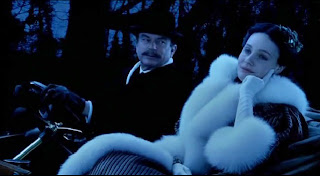Romola Garai stars as Angela Deverell in François Ozon's Angel.
French director François Ozon wears his old Hollywood references a bit too close to his chest in his 2007 melodrama Angel. After the one-two punch of 8 Women (2002) and Swimming Pool (2003), it may come as a surprise that what seems on paper to be one of his most accessible films is actually one of his most notable misfires.
Michael Fassbender as Angel's lover, Esmé.
The English-language film stars Romola Garai, Michael Fassbender, Sam Neill and spins the tale of Angela "Angel" Deverell (Garai), a young girl in Edwardian-era England who aspires to become a published writer. Through the support of publisher Théo (Neill), she becomes a bestselling romance writer, and the working-class girl is catapulted into high society. An encounter with ardent fan and eventual assistant Nora (Lucy Russell) leads her to Nora's brother Esmé (Fassbender), the love of her life who also figures heavily in her demise.
No shortage of melodrama in Angel.
It isn't difficult to see what Ozon is trying to create in Angel. His template is old Hollywood melodramas and Douglas Sirk films, with their luxurious colors, sweeping scores, and tragic storylines. However, Angel never reaches those glorious highs, coming off as a cheap wannabe. His version is saddled with an insufferable central character, sometimes cheap-looking production values, and a story that's never fully involving. Still, at times, Ozon manages to capture the grandeur and beauty of the films he references, and you see what the film could have been. (The score, by Phillippe Rombi, is one Angel's most successful elements.)
Oh no she didn't: Angel goes off the deep end.
Could it be that Ozon's talents were lost in translation? Romola Garai's performance suggests so. It is painful to watch Garai, who made such a confident, absorbing lead in the 2003 adaptation of I Capture the Castle, commit wholeheartedly to a performance that is all widened eyes, dramatic line readings, and grand flourishes. The contrived quality of her acting clearly harkens back to Old Hollywood style, but the failure to temper that contrivance with believable emotion makes for uncomfortable viewing. She was clearly directed by someone who didn't understand the nuances of her acting well enough. It doesn't help that Angel is ill-mannered, talentless, and a huge pill: the audience can't vicariously live through a protagonist they feel no affinity for.
Michael Fassbender, a year before his breakout role in Hunger.
The film's Old Hollywood-influenced style cleverly reinforces Angel's central issue of taste and trends: what is embraced, what isn't; what stays in style, what doesn't. Angel's books, with their overripe stories and flowery language, go through a period of success before public taste heads in a different direction. In direct contrast, Angel's handsome, tortured, but ultimately slippery husband, Esmé, is an abstract painter whose works are initially reviled in society, but come to be lauded in time. Released only a year before Michael Fassbender's breakout role in Steve McQueen's Hunger, Angel gives us a taste of the killer charm he used to such devastating effect in Andrea Arnold's 2009 Fish Tank. There is a certain wiliness in his performance: he keeps us guessing till the very end whether he is playing a good person or not.
Upon its release, Angel was met with mixed critcal response, and hardly made a splash in the worldwide box office. But who can predict a film's fate? Angel may not be successful on its own terms, but when considered as one in Ozon's steadily growing oeuvre, its themes clearly link with his other work. I can see a researcher discovering this film while researching his filmography. But then again, the film might not even be readily accessible in 30 years. We'll just have to wait and see how kind time is to his work.










No comments:
Post a Comment